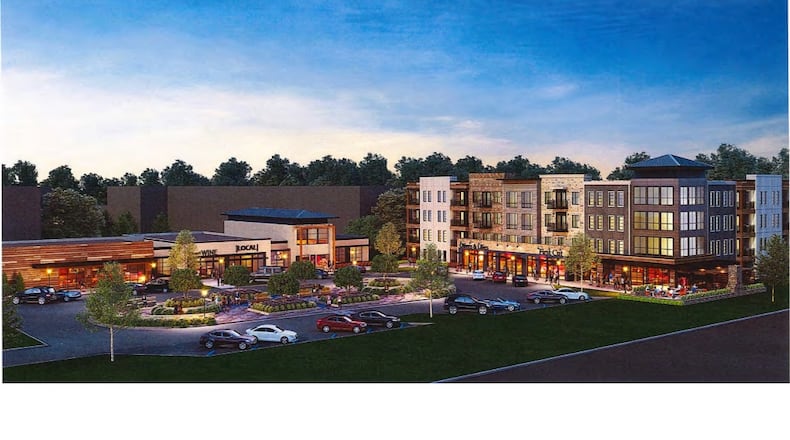More than 900 apartment units have been proposed in Gwinnett County for the area surrounding Sugarloaf Mills and the Infinite Energy Center as more residents look for a place to live closer to jobs and activities in the area.
The area between Lawrenceville and Duluth is relatively unique in its booming apartment growth compared to other parts of Gwinnett County where residents have been vocally opposed to denser housing options.
It’s a hot destination for business and people in Gwinnett: near I-85, with many employers and the Infinite Energy Center campus on Sugarloaf Parkway bringing a rotation of concerts, conferences and other major events. At least four complexes in the Sugarloaf area, representing 975 apartments, were approved by Gwinnett County between 2017 and 2019, according to Alyssa Davis, executive director of the Sugarloaf Community Improvement District. Not all have been completed.
Apartments have long been present in the Sugarloaf area, already dense with retail and straddling some of the county’s busiest roads, so it’s not a dramatic change to add more, Davis said. She oversees the CID, an organization that promotes business in the area.
“It’s an entertainment center, it’s an office center, and its proximity to I-85 makes it an attractive place to move,” Davis said. “The work that’s going on now at the Infinite Energy Center and new work that’s planned is what’s sparkng interest too.”
In many other parts of the county, officials and residents alike worry about apartments changing the character of neighborhoods long populated by single-family homes, often citing potential increases in traffic and school enrollment. The county’s housing stock has been estimated at 75% single-family homes, which means apartments aren’t always welcomed.
In one incident last fall, plans for 450 apartments in a high-end gated complex near the banks of the Chattahoochee River were scrapped following an outcry from residents. A representative for the developer said at the time, "Overwhelmingly what we heard was rental was pretty toxic, resoundingly, right from the start." The development was eventually approved by the Duluth City Council once it was whittled down to 161 townhomes, 304 single-family homes and zero apartments.
Near Dacula, Gwinnett County staff have recommended plans for a 168-unit "affordable" apartment project be denied because it's too dense for the surrounding area, mostly zoned for single-family and manufactured homes. That plan will be voted on by county commissioners next week.
But the Sugarloaf area differs from parts of the county that have pushed back on apartments in that it’s already got a significant number of them, and it doesn’t have many single-family homes at its core. The area that makes up the Sugarloaf Community Improvement District stretches about 2.5 miles from east to west and 5 miles north to south, with the intersection of Sugarloaf Parkway and I-85 as its central anchor.
A 194-unit complex within walking distance of the Sugarloaf Mills shopping center broke ground in September, and a mixed-use development with 390 apartments was recommended for approval by the Gwinnett County Planning Commission in January. It still needs the approval of county commissioners before it moves forward.
The continued growth in the Sugarloaf area has not gone unnoticed or without opposition. A proposed 265-unit apartment complex was denied by the planning commission in February, with Chairman Kim Hartsock citing the land immediately surrounding the proposed development that’s exclusively zoned for commercial or light industrial uses.
A neighbor formally opposing the project at the meeting warned of potential oversaturation of the market. “Something is going to drop,” said Hing Lee, a Duluth resident, referring to the Sugarloaf apartments. “Look over at the apartments around the Gwinnett Place Mall. Fifteen years ago, they were fine, they were luxury, they were great. But look at them now.”
From 2018 to early 2019, the Sugarloaf area had one of the county’s highest concentrations of apartment complexes and other multifamily housing — both existing and under construction — according to the Atlanta Regional Commission and development database CoStar.
The other areas in Gwinnett with significant numbers of existing apartments and other multi-family developments are Norcross and the Mall of Georgia area, according to the ARC and CoStar data. Other hubs for new apartment construction in the county included Lawrenceville and Buford.
Increasing the proportion of people who both work and live near Sugarloaf may help cut down on traffic as more people take shorter trips or are able to walk to work, shopping and entertainment, Davis said. Future Gwinnett County transit plans might also make Sugarloaf a transportation hub. Proposed plans include bus rapid transit stations at the Infinite Energy Center and Sugarloaf Mills. Both of those BRT routes would offer connectivity to MARTA rail.
Apartments also cater to young adults and “empty nesters,” both age groups that are likely to be working and have a smaller number of people in their households. Those two age groups make up a significant proportion of the people living in the Sugarloaf area, Davis said.
Residential growth in the Sugarloaf area is called for in the county’s 2040 Comprehensive Plan, a roadmap for future development. It won’t just boost the neighborhood businesses, but help balance out density and maintain the suburban feeling of other Gwinnett neighborhoods by concentrating growth, Davis said.
“It makes sense to preserve all the great neighborhoods around Gwinnett,” Davis said. “Let’s put multi-family residential right where we have these mixed-use centers, especially where we’re working on creating more connectivity with walking, biking and transit.”
About the Author





